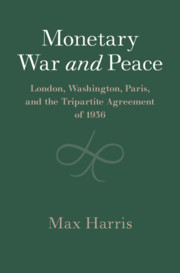‘Max Harris’s fascinating story of the 1930s Tripartite Agreement is well worth reading on two levels. Harris’s detailed account of how the cooperative system for managing exchange rates worked, based on his reading of the central banks’ archives, is history at its best applied to a crucial economic challenge of the time. And his analysis bears lessons for how countries today might cooperate to meet the economic challenges of our time - if they have a will to do so. The book is an outstanding contribution by a highly promising young scholar.’
Benjamin M. Friedman - Harvard University
‘Max Harris has written an elegant and deeply researched book that uncovers the politics and economics behind a central event in the making of modern international monetary governance, the 1936 Tripartite Pact. This was one of the turning points that brought the world out of the monetary chaos and the competitive devaluations of the Great Depression.’
Harold James - Princeton University
‘Comprehensive, cogent, and extraordinarily well written, Monetary War and Peace is a major accomplishment, which should be read by anyone interested in international monetary relations, the interwar period - or international economics more generally.’
Jeffry Frieden - Harvard University
‘International monetary cooperation has never been more urgent and imperative than today. Max Harris sheds light on the prerequisites by unearthing new evidence on one of the most important but also forgotten 20th century episodes of international cooperation, the Tripartite Agreement of 1936. There are important lessons here for policy makers. For the rest of us, who knew that monetary history could be so entertaining?’
Barry Eichengreen - University of California, Berkeley
‘Using primary data sources including recently released Bank of England archives, Max Harris shows that the late 1930s tripartite currency stabilization arrangement between the US, France and the UK bore many of the hallmarks of the post-war Bretton Woods system. Deeply researched and elegantly written, Monetary War and Peace offers a fresh perspective on a little-known period in monetary history that contains valuable lessons for today.’
Kenneth Rogoff - Harvard University



